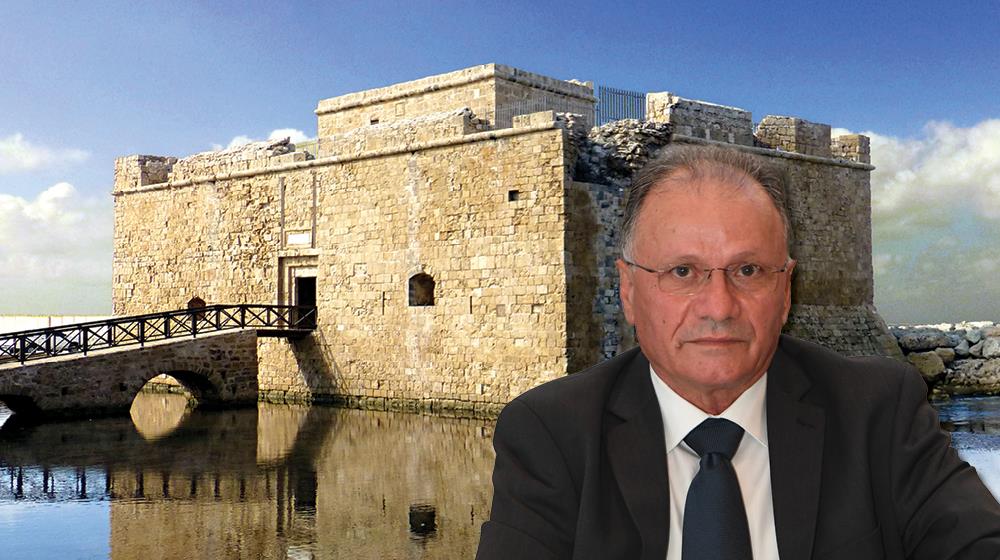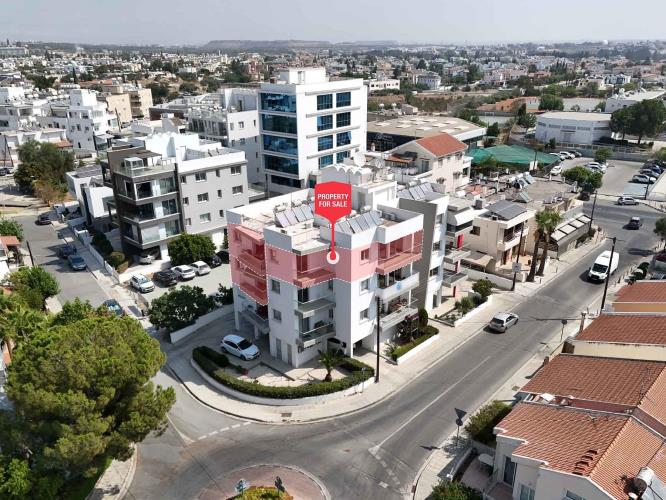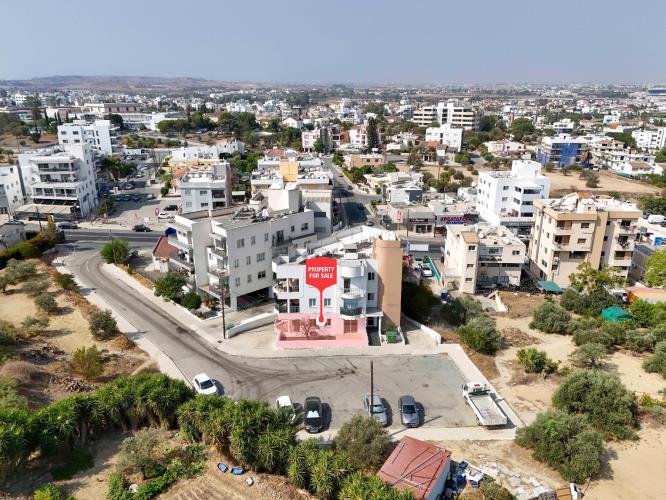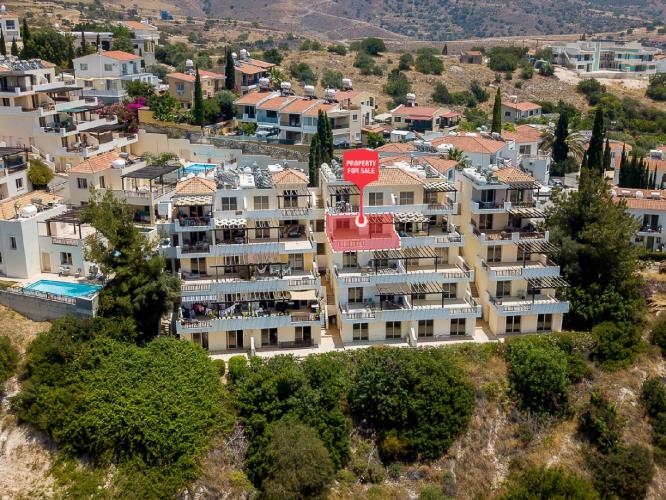"Paphos is at a pivotal moment in its development and I envision a future in which the district evolves into a model for sustainable, smart and inclusive urban living – balancing its rich historical identity with modern innovation," George Mais, the President of the Paphos Chamber of Commerce & Industry (PCCI) notes.
In a recent interview with GOLD magazine, Mais also comments on the notable transformation of the area's real estate sector in recent years, with Paphos now positioned as the leading city in Cyprus for luxury property transactions. "This surge is largely fuelled by foreign demand, especially from non-EU nationals seeking lifestyle properties, investment opportunities or access to the Permanent Residency Programme," he explains.
Mais also discusses the growing interest in Paphos from companies looking into relocation and headquartering, pointing out that "infrastructure initiatives are shaping Paphos into a dynamic, accessible, and future-ready hub for business and quality living" while also sharing his view on what more can be done to best attract new businesses to the city.
The PCCI President, in addition, talks about tourism's role in Paphos' economy and elaborates on Paphos' digitalisation path.
There is growing interest in Paphos as a city for company relocation and headquartering and a place for newcomers to live and work in. What are the key developments in infrastructure that will further expand Paphos’ appeal?
First, a €75 million upgrade of Paphos International Airport is set to boost capacity and improve service levels, strengthening accessibility for both business and leisure travel. Another important project is the development of the Paphos Marina, which is expected to become a landmark for the region. Equally transformative is the Neapolis Smart EcoCity, a model development that integrates residential, commercial, educattional, healthcare and leisure uses – centred around sustainability and innovation. The city’s commitment to smart city technologies is helping create a modern, digital, and energy-efficient environment, improving both business operations and quality of life. Together, these infrastructure initiatives are shaping Paphos into a dynamic, accessible and future-ready hub for business and quality living.
How can Paphos attract more businesses and what steps are being taken in this direction?
Paphos is actively positioning itself as an attractive destination for businesses through strategic planning and targeted investment initiatives. More than €245 million from EU recovery funds has been allocated to projects in the district to support digital transformation, energy efficiency and youth entrepreneurship, infrastructure modernisation and sustainable growth initiatives. To strengthen this momentum, further steps are needed: streamlining zoning and permit issuance processes, introducing targeted tax incentives and offering support to SMEs and digital nomads. Equally important is the investment in human capital through stronger ties with academic institutions, the expansion of international schooling options and continuous improvements to the quality of urban life, such as green spaces and cultural programming.
Tourism has always been important to the Paphos economy. What upgrades to the city are necessary if tourism is to grow?
Tourism remains a cornerstone of Paphos’ economy and its continued growth depends on a strategic blend of infrastructure upgrades, cultural preservation and innovation in the visitor experience. Investments in the hospitality sector, including the modernisation of hotels, the diversification of accommodation types and the expansion of quality dining and leisure facilities, are equally important to meet the expectations of a more demanding audience. On the cultural level, Paphos’ archaeological and historical assets remain major attractions. Ongoing restoration of key sites and muse-ums and the development of interactive and educational experiences will attract visitors interested in heritage and history. In parallel, environmental sustainability must guide all development. Protecting the natural beauty of beaches, trails and parks and implementing green tourism practices will ensure long-term viability while aligning with the trend for more responsible travel. From a promotional standpoint, there is a need to expand international marketing efforts, especially through digital platforms, to raise global awareness of Paphos as a year-round destination. Hosting festivals, sports events and cultural activities throughout the year can effectively reduce seasonality and attract a more diverse visitor base, including adventure seekers, wellness travellers and digital nomads..
How has the real estate landscape changed in Paphos, due to growing interest from both local and international investors?
Paphos’ real estate market has undergone a notable transformation in recent years, driven by heightened interest by local and international investors. Paphos has now positioned itself as the leading city in Cyprus for luxury property transactions, particularly for residences priced above €500,000. In fact, the average house price has now reached approximately €693,000, reflecting a year-on-year increase of nearly 17%. This surge is largely fuelled by foreign demand, especially from non-EU nationals seeking lifestyle properties, investment opportunities or access to the Permanent Residency Programme.
Meanwhile, local demand is also growing, with domestic real estate transactions rising considerably in early 2025. The average purchase by Cypriot buyers is approximately €180,000, primarily of smaller and more affordable units.
What other challenges does the city face and how is it overcoming them?
Paphos faces several structural and economic challenges but it is making steady progress in addressing them. One of the key challenges is the overreliance on tourism and construction – sectors that are vulnerable to external shocks and seasonal fluctuations. In response, Paphos is pursuing economic diversification by investing in higher education, research and knowledge-based industries. Infrastructure delays have long hindered economic development. However, in collaboration with local authorities, we continue to press the Government for the timely completion the projects. Seasonality in tourism remains another pressing issue. To combat this, Paphos is developing a more sustainable and diversified tourism model. This includes promoting agrotourism, cultural tourism, religious tourism and hosting year-round events that attract a broader range of visitors. Urban development and heritage preservation have also been central to the city’s strategy. With significant EU funding, Paphos has renovated public spaces, upgraded pedestrian areas and restored historical landmarks. These actions have enhanced both the aesthetic appeal and livability of the city. In terms of governance, Paphos has made strides in improving administrative efficiency and transparency. A more results-oriented and cooperative approach has emerged, allowing for better coordination between public and private stakeholders and the faster execution of strategic initiatives.
What projects are currently underway to enhance the city’s digitalisation?
Paphos is actively advancing its digital transformation through a series of innovative smart city projects. The smart parking system involves the installation of sensors across thousands of parking spaces in the city centre. Integrated with a mobile app and SMS service, it allows users to locate and pay for parking in real time – reducing congestion, lowering emissions and improving urban mobility. The city is also implementing a comprehensive Geographic Information System (GIS), which maps and monitors all public utilities and infrastructure in real time, enhancing planning and maintenance. There also is the deployment of a city-wide LoRaWAN network, enabling Internet of Things (IoT) connectivity across Paphos. This serves as the backbone for multiple smart functions, including smart lighting, environmental monitoring and a smart water management system. Paphos is also digitising its munici-pal archives, improving transparency and public access to documents while streamlining internal workflows.
On the cultural front, the city is embracing technology to enrich its tourism offering. The Explore Paphos app, equipped with augmented reality (AR) features, provides interactive maps, multimedia content and guided tours, enhancing the visitor experience. This is complemented by a growing network of touchscreen kiosks and QR-enabled smart signage at heritage sites.
How do you see the city of Paphos changing and how do you envision the broader district in the future?
Paphos is at a pivotal moment in its development and I envision a future in which the district evolves into a model for sustainable, smart and inclusive urban living – balancing its rich historical identity with modern innovation. In the coming years, I see Paphos becoming a smart and eco-friendly city, with the widespread adoption of green building practices, renewable energy infrastructure and digitally integrated public services. Tourism will remain a key economic pillar but with a shift toward sustainability and cultural depth. I envision enhanced experiences at our UNESCO World Heritage Sites through AR and VR technologies, bringing history to life in immersive ways. At the same time, we will promote eco-tourism, local festivals, traditional crafts and regional cuisine to offer authentic, year-round experiences while strengthening our cultural identity. I also see Paphos emerging as a regional leader in agritech, renewable energy and digital services, driven by innovation hubs, business incubators and partnerships with universities. Young entrepreneurs and startups will find new opportunities through co-working spaces and digital infrastructure, while rural communities will benefit from agrotourism and the expansion of remote work options. Transport and connectivity will also be central to this vision. Education will naturally play a vital role in shaping the future and I foresee the establishment of new academic institutions and research centres, particularly those focused on Mediterranean studies, sustainability and innovation, which will retain local talent and attract international students and researchers. Ultimately, I imagine a Paphos that is resilient, forward-looking and globally connected – a district where heritage and modernity coexist.
This interview first appeared in the August edition of GOLD magazine. Click here to view it.
















